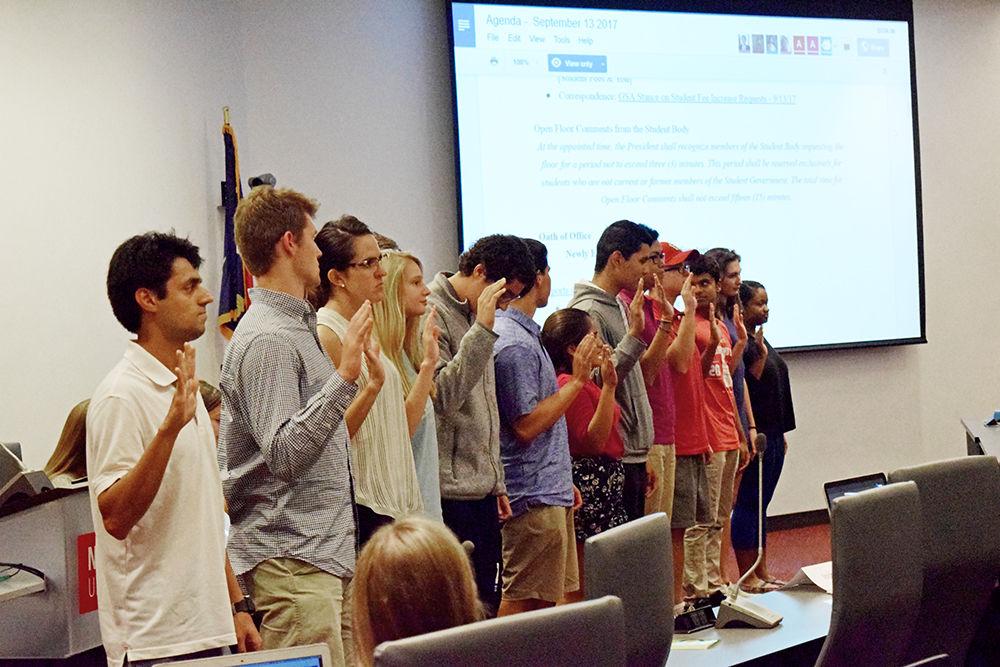Wednesday night, Student Senate voted down a resolution to endorse an increase to the Transit Operations Fee and endorsed no increase to the Student Government Fee.
The meeting lasted just under four hours, with most debate occurring over fee legislation and the proposal to pass a dress code for Student Senate meetings.
Transit Operations Fee
The failure to pass the transit fee resolution means that Senate expressed no formal recommendation regarding the proposed increase to the fee, according to Senate President Mitchell Moravec, a fifth-year studying psychology and materials science and engineering.
“At this point, I suppose there’s still an opportunity for Senate to pass a recommendation at the next meeting,” Moravec said. “That would be ideal.”
Moravec, as Senate president, sits on the Student Fee Review Committee, which submits a recommendation to the Tuition and Fees Conference Committee, which makes the final report submitted to Chancellor Randy Woodson to sign. Moravec’s vote is guided by the formal recommendation passed by Senate.
If Senate passes no recommendation by the given deadline later in September, Moravec says he will “mull over the discussion” in Senate and decide his vote after hearing “as many voices as I can.”
Senators on the Committee on Tuition and Fees decided Sept. 7 to recommend the $12 increase of the transit fee, by a vote of 4-1 in favor.
Catherine Reeve, director of NCSU Transportation, and Pat Flanary, assistant director of finance for Transportation, were in attendance for the Senate discussion on the transit fee to answer questions from senators. Technician interviewed them about their thoughts on the debate.
“We’re not in the business of making money,” Reeve said. “This is what it takes to run the service.”
Nick Faulkner*, a graduate student studying microbiology and agricultural and life science and proxy for Sen. Ann Savage, said during debate that the transit fee has increased by 19 percent over the past four years. Flanary said that, despite this claim, which he could not verify at the time, WolfLine ridership has increased 25 percent in the last four years.
“Ridership has grown faster than the fee has,” Flanary said.
Reeve said that it was the first time in the 20 years since she began working at NC State that a transit fee increase resolution did not pass Student Senate. Reeve said that one result of this would be that plans to order three new buses to be used in the WolfLine service will be reconsidered.
Senator Kate Puricz, a second-year studying fashion and textile management and senator for the College of Textiles, spoke in objection to the fee increase, focusing on the poor bus service to the College of Textiles.
“We produce over half the master’s degrees in the textiles field, and the fact that I personally have to wait 20 minutes for a bus every single time I go to the [College of Textiles], that’s ridiculous.” Puricz said. “I would like them to fix this system before we give them free range to any more money. That’s crazy to me.”
Bischoff said later that the sentiment of wanting Transportation to improve their service while also wanting to vote down the fee increase recommendation was “counterintuitive.”
“You can’t ask more out of them at the same time as cutting their budget,” Bischoff said.
Student Government Fee
Senators passed a resolution recommending a $0 increase to the Student Government. The Committee on Tuition and Fees had recommended a $0.20** increase.
“SG already has rollover each year due to not spending its full budget,” reads the report from the Tuition and Fees Committee.
Most of the money Student Government receives through the Student Government Fee goes toward funding student groups and initiatives.
Dress code
During debate on a bill to establish norms of decorum for this session of Student Government, Sen. Puricz proposed an amendment to establish a “business casual or professional casual” dress code. A similar amendment to establish a “dressy/snappy casual” dress code had previously failed 13-30 against.
Sen. Jordan Bischoff, a third-year studying microbiology, responded by saying the proposed amendment a “waste of time” since a previous vote had already failed to pass a dress code amendment.
Later in debate, Puricz asked whether, in the absence of an official dress code, she would be permitted to come into a Senate Meeting “in a bathing suit.” After clarification on the question, Moravec responded that “without an amendment, there would be no formal dress code to enforce.”
Bischoff responded by asking whether anyone would “really come in a bathing suit just to prove a point.” The question was not allowed because it was not asked during a period of debate.
In previous debate, multiple senators had cited busy schedules before regular Senate meetings as a reason they would vote against a dress code amendment.
After over 30 minutes of proceedings, the decorum bill was passed without a dress code amendment.
*Nick Faulkner is a senior staff photographer for Student Media.
**Editor’s note: This story has been updated to reflect the correct amount endorsed by the Committee on Tuition and Fees.








